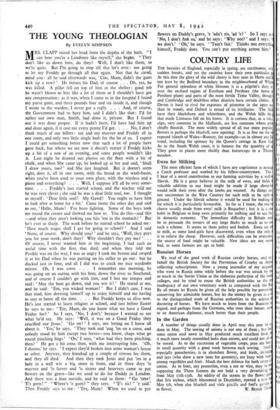COUNTRY LIFE
Tars beauties of England, especially in spring, are continuous, WI sudden breaks, and yet the couitties have their own particular At this date the glory of the wild cherry is best seen in Herts and not least by the Bedford boundary in the neighbourhood of Whi For general splendour of white blossom it is a pilgrim's duty to over the orchard region of Evesham and Pershore (the home Pershore plum) and parts of the most fertile Teme Valley, though and Cambridge and'doubtless other districts have certain claims. Devon is hard to rival for expanses of primrose in the open than in woods, and Oxford is proud of its fritillaries. The Mc have their blackthorn and whitethom, and the Welsh hills the that made Linnaeus fall on his knees. It is curious that, as a rule, slips, very common in the Midlands, are less common where p chie,fly flourish. The most widely spread of all our more popular flowers is perhaps the bluebell, now opening: It is as fine on the exposed islands of Wales—Ramsey, for example—as in almost any wood, including the spinney by the Queen's cottage in Kew G As to the South Welsh coast, it is famous for the quantity of They grow in places more thickly than buttercups in a Than meadow.
Ewes for Milking The most efficient farm of which I have any -cognizance is mans a Czech professor and worked by his fellow-countrymen. This I hear of 'a novel contribution to our farming activities by a wellSlovak. He is a great believer in the milk of ewes, and holds valuable addition to our food might be made if large sheep-f would milk their ewes after the lambs are weaned. As things are, not uncommon in the West Country for such milk to be spilt ground. Under the Slovak scheme it would be used for making for which it is t3articularly favourable. So far as I know, the one cheese usually made from ewes' milk is Roquefort ; but it is a habit in Belgium to keep ewes primarily for milking and to use the in domestic economy. The immediate difficulty in Britain see be to persuade the owners of any large flocks so much as to c such a scheme. It seems to them paltry and foolish. Ewes are ch to milk, as some land-girls have discovered, even when the only is to relieve the sheep. However, such difficulties can be overcome the source of food might be valuable. New ideas are not nec bad, as some farmers are apt to hold.
Russian Horses We read of the good work a Russian cavalry horses, and or behalf the British Society for the Prevention of Cruelty to collecting subscriptions. Now a young journalist of my acquaz who went to Russia some while before the war was struck by n so much in the Soviet Union as the elaborate perfection of the vetc colleges, and he tried to rouse the British authorities to the e inadequacy of our own veterinary work as compared with the R By all means let Russia be given all the help possible for presen conserving her admirable horses, but let the money be given as a to the distinguished work of Russian authorities in the science doctoring of horses. We have much to learn from the Russians regard, and perhaps from the Germans, who treat their horses, ac to an American diplomat, much better than their people.
In the Garden A number of things usually done in April may this year be is done in May. The sowing of onions is not one of them ; but last some onion seed sown in May produced much excellent food, it much more nearly resembled leeks than onions, and could not, of be stored. As to the succession of vegetable crops, peas are best in small quantity with a good week between each sowing. Small especially gooseberries, is in abundant flower, and birds, incl and jays (who show a new taste for greenery), are busy with buds among vegetfibles and fruit. Much the best defence for both crops cotton. As to frost, any protection, even a net or *ire, may be supposing the Three Icemen do not hold a very devastating from May irth-r3th. An oddity of the sessan in the flower that Iris stylosa, which blossomed in December, opened a new May 5th, when also bluebell and viola gracilis and fool's par*/
Is
to flower. W. BEAcH






















 Previous page
Previous page